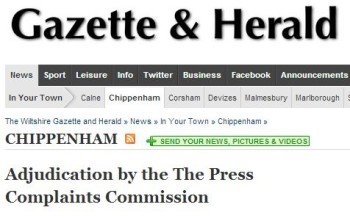
(Credit: Gazette and Herald, screenshot)
The UK Press Complaints Commission called out the Wiltshire Gazette and Herald for its reporting on a suicide according to a recent PCC report. The Gazette and Herald is a weekly local newspaper in the UK, according to Mondo Times.
The Gazette and Herald’s Sept. 6 report on a man’s “inquest hearing” broke the PCC’s standards for “intrusion into grief or shock” because the article “included details of the type of gas involved, the manner in which it had been inhaled and the state in which he had been discovered.” Noting that the Gazette and Herald defended its reporting as all information “in the public domain,” the :PCC explained:
“Inquests will generally include a high level of detail about the method of death. Newspapers are entitled to report inquests in cases of suicide, but in doing so must take care to limit the level of detail involved to avoid breaching the terms of Clause 5…The Commission concluded that, taken together, this level of detail was excessive.”
The PCC pointed to its previous guidance on reporting on suicides. In a 2006 press release about the “rule on reporting suicide,” the PCC announced its “new sub-clause” reading “When reporting suicide, care should be taken to avoid excessive detail about the method used.”
“The Code’s requirement to avoid excessive detail exists to minimise the risk of imitative suicides,” the PCC’s Head of Complaints and Pre-publication Services Charlotte Dewar is quoted as saying.
iMediaEthics asked the PCC if if the person who complained is related to the person who committed suicide and if the person who committed suicide was a public figure. The PCC’s Catherine Speller told iMediaEthics by email that “I cannot give any information about either the deceased, or the complainant, other than what was included in the text of the adjudication.”
When asked if the Gazette and Herald had to unpublish the report in question because a search of the newspaper’s website didn’t appear to produce the report, the PCC’s Speller said that the Gazette and Herald “amended the online version of the article so that those aspects that were found to breach the Code are no longer publicly available.” Speller added that
“The PCC has received a number of complaints about the reporting of suicide. The work done by the PCC in the area of suicide reporting has been well-documented over recent years and we are proud of the general improvements there have been in the way that newspapers and magazines cover such tragedies. Our close work with Samaritans is a good example of the way in which the PCC has facilitated a constructive dialogue between an expert organisation and key editorial executives.”
The Gazette and Herald published the adjudication online. iMediaEthics has written to Gazette and Herald editor Gary Lawrence asking if the adjudication was published in print, if the newspaper unpublished the story in question, if the person who committed suicide was a public figure, if the Gazette and Herald has any response to the ruling and if the ruling will affect the way the newspaper reports on suicides moving forward. We’ll update with any response.
Many organizations offer guidance for reporting on suicide, as iMediaEthics has written numerous times. For example, the Dart Center for Journalist & Trauma hosted a workshop in September on reporting on suicide. Last month, Globe and Mail public editor Sylvia Stead defended the Canadian newspaper’s coverage of the suicide of teenager Amanda Todd. iMediaEthics also wrote last month about the Hong Kong Journalists Association’s criticism of the Oriental Daily News coverage of a child’s suicide.





